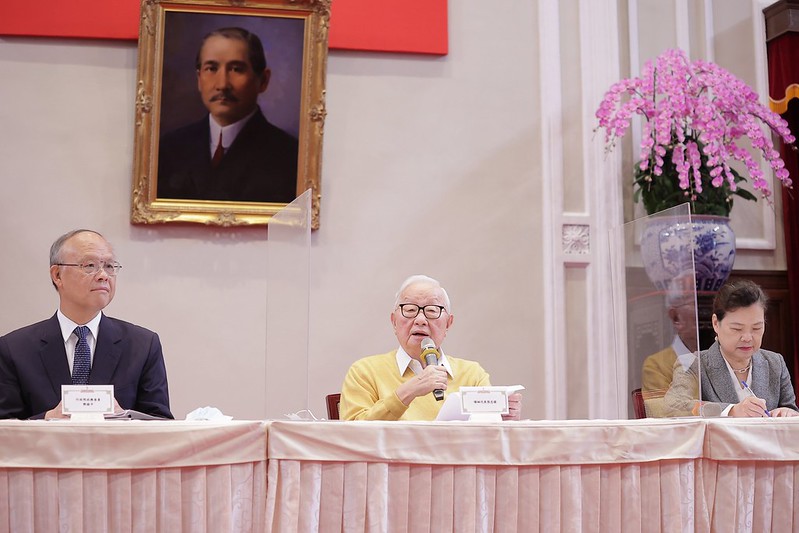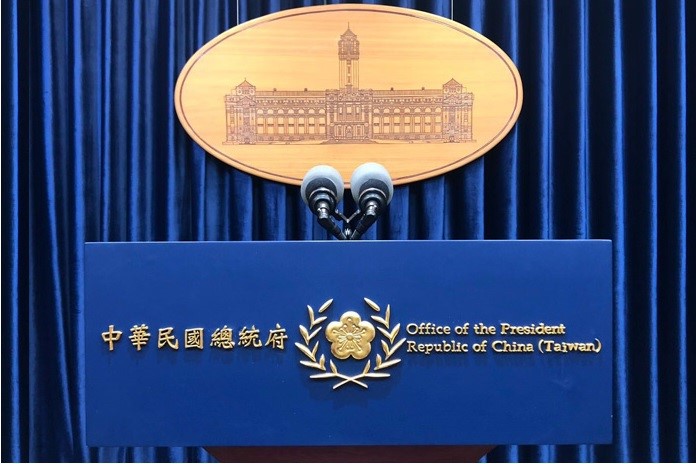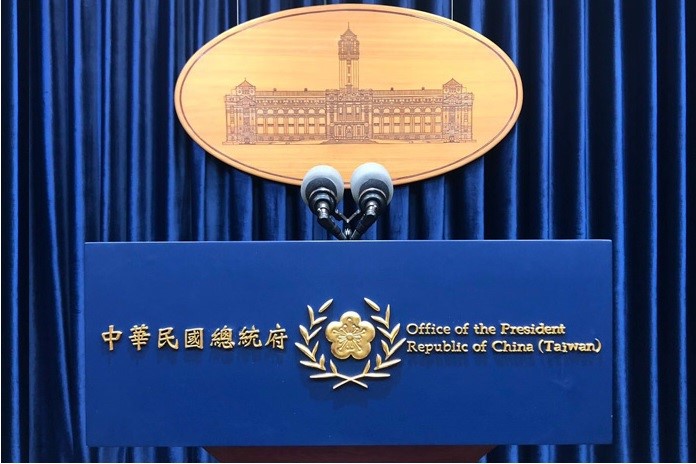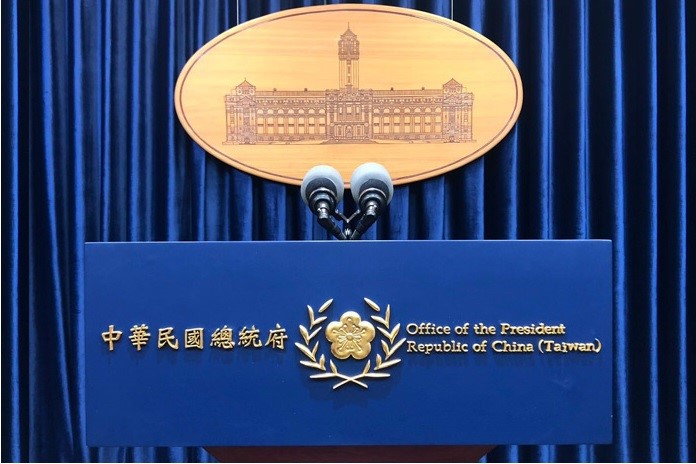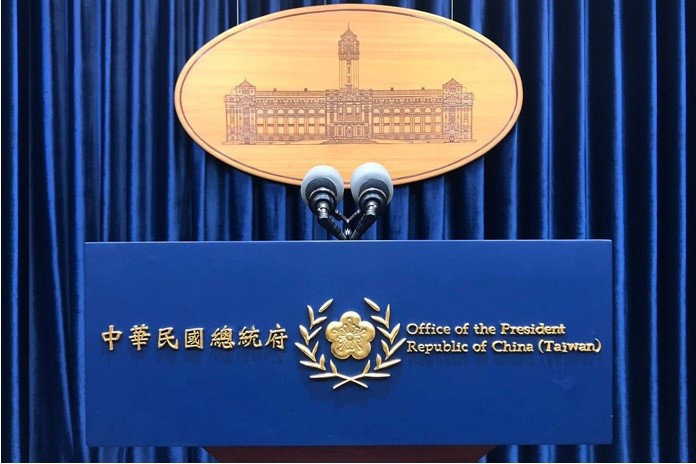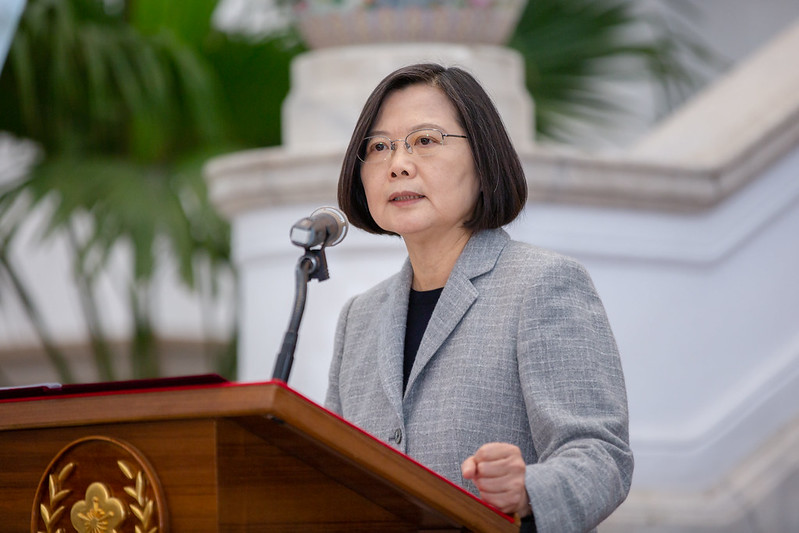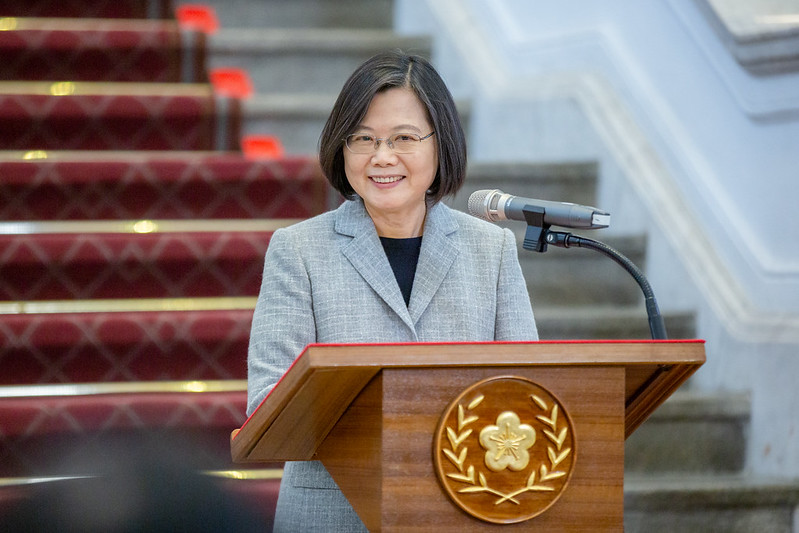News & activities
 News releases
News releases
On the morning of April 1, President Tsai Ing-wen, accompanied by Premier Su Tseng-chang (蘇貞昌), Minister of Health and Welfare Chen Shih-chung (陳時中), Minister of Economic Affairs Shen Jong-Chin (沈榮津), and Foreign Minister Joseph Wu (吳釗燮), delivered remarks in the Entrance Hall of the Presidential Office Building. The president pointed out that Taiwan is actively bolstering epidemic prevention cooperation with countries around the world. She said that once we can satisfy domestic demand, we will provide face masks, pharmaceuticals, and technologies to help the international community. Taiwan is willing to exert its influence and join hands with the international community so that we can overcome this challenge together, the president stated.
A translation and transcript of President Tsai's address follows:
As we face the threat of COVID-19, our entire country has worked together to bring the domestic outbreak under control, and our efforts have received both attention and praise from the international community.
We have also seen Taiwan transform from an importer to the world's second-largest producer of face masks. Our daily production of face masks continues to grow and can already provide an ample supply to satisfy domestic demand.
Beginning next Thursday, residents will be able to buy nine adult face masks or 10 children's face masks every 14 days. We have also set regulations for shipping face masks overseas to help keep Taiwanese citizens living overseas safe.
We have continued to bolster our domestic epidemic prevention capabilities, but I want to remind all citizens that if the global outbreak is not brought under control, the pandemic will never end, and Taiwan will continue to be in danger.
The COVID-19 pandemic is global, and conditions in each country affect all other countries. We cannot stop the spread of COVID-19 simply by preventing an outbreak within Taiwan. All members of the international community must pool their capabilities and work together to overcome this challenge.
Over the past months, we established a "national team." Now, we must take part in a global campaign and work together with other countries to set up a zone defense and comprehensively prevent the spread of this virus.
Currently, many countries are actively seeking to cooperate with Taiwan on rapid testing, vaccines, pharmaceutical R&D, and our proactive efforts to produce materials needed to stop the spread of COVID-19.
For example, we are currently discussing prevention strategies and sharing research results with the United States, the European Union, and the Czech Republic. We are also engaging in cooperative exchanges of epidemic prevention materials with Australia and the United States. For our diplomatic allies, we will also provide assistance so that they can acquire the medical supplies they need by purchasing them locally.
Recently, we have seen news reports about countries whose medical systems have been severely impacted by this pandemic. Medical workers are risking their lives to help patients, but feel helpless due to a lack of medical materials, and many have even become infected themselves.
Today, I want to tell the international community that Taiwan will actively bolster our cooperation with all countries to prevent the spread of COVID-19. Out of humanitarian concern, Taiwan cannot stand by while countries are in dire need of assistance to stop the spread of this virus.
We are willing to provide assistance to the international community in three areas: face masks, pharmaceuticals, and technologies.
First, we will provide support for face masks. Currently, Taiwan can produce 13 million face masks per day. This number continues to increase, and will soon reach 15 million. At this stage, we will donate 10 million face masks, or around one day's production, to support medical workers in countries where the COVID-19 outbreak is particularly severe. Later on, we will provide even more support to the international community based on our domestic production capacity.
Second is support for pharmaceuticals. Clinical research in some countries has shown that quinine can help treat patients with mild symptoms. The government has therefore asked firms to increase quinine production, and we will give countries in need appropriate support.
Third is technological support. We will share our domestic electronic quarantine system that utilizes big data analytics, so that countries in need can accurately trace the contact history of confirmed cases, and investigate outbreaks effectively to prevent them from spreading. Our public and private hospitals will also continue to use videoconferencing to share our disease prevention experience and technologies to countries that need help.
I want to emphasize that this kind of cooperation is possible because of Taiwan's powerful capabilities and the government's ability to help other countries in addition to keeping Taiwan safe. Because we have kept the domestic outbreak well under control and prepared adequate supplies of necessary materials, we have the ability to cooperate with other countries and provide humanitarian aid. Once we achieve adequate supply to satisfy domestic demand for other medical supplies, we will provide them to help the international community as well.
The collapse of a medical system in any country will not only impact that country, but will aggravate the pandemic worldwide. As a member of the global community, Taiwan is therefore willing to take on the responsibility of benefitting others as well as ourselves.
We want everyone to not only see that "Taiwan can help," but that "Taiwan is helping." Even more, as we face the challenges of this global pandemic, we want to show that Taiwan is indispensable to collective global efforts to stop the spread of COVID-19.
Over the past months, we have seen countless acts of bravery and sacrifice from medical workers around the world. It is our duty as global citizens to give them our full support.
We need to step up cooperation, and that means sharing experiences and materials, and working together to develop treatments and vaccines.
Pandemics cannot be stopped by one country alone, and Taiwan stands ready to do our part.
Going forward, we will donate surplus masks and other supplies to our allies and countries hit hardest by COVID-19. These supplies will go to medical workers on the front lines who are working around the clock to save lives.
In times of crisis, countries around the globe must unite, show solidarity, provide mutual assistance, and work together to fight the coronavirus. Taiwan is willing to exert its influence in this battle, and join hands with the international community so that we can overcome this challenge together.
